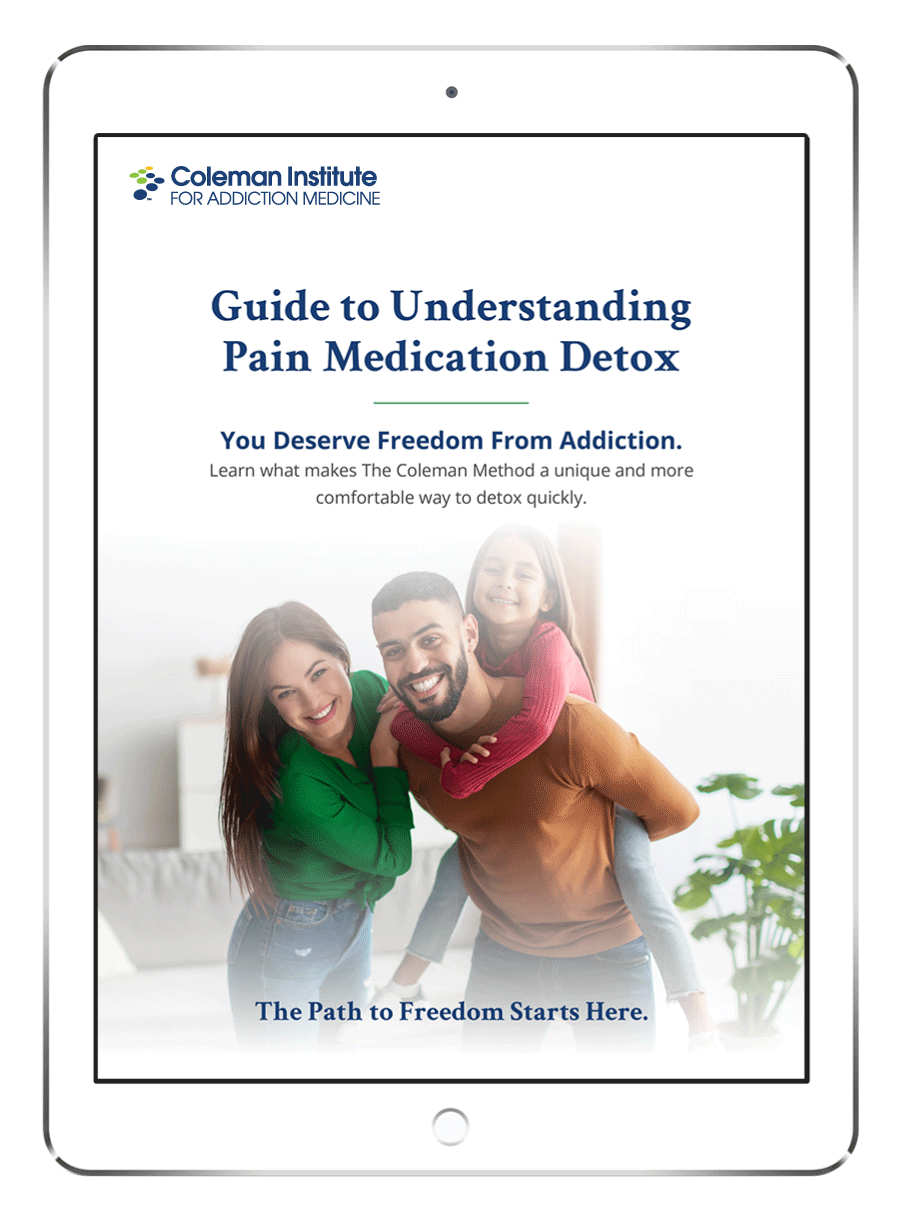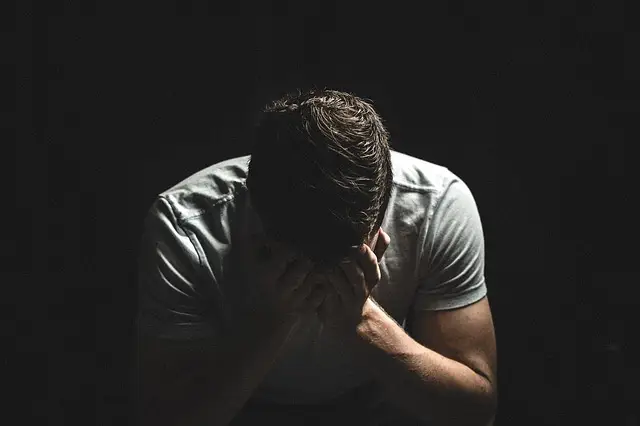Pain Medication Detox
The Coleman Method is a safer, faster, and more comfortable way to start your journey toward recovery.
Outpatient Pain Medication Detox Treatment
Why Choose a Medical Detox Off of Opioid Pain Medications?
Chronic pain is incredibly difficult to live with and manage. This condition is made even worse by having to manage the prescription opiate painkillers that, over time, can create dependency and lead to withdrawal symptoms when you miss a dose, even if you’ve only ever taken them as prescribed.
If you or a loved one are seeking help getting off of opioid pain medication, it’s important to remember: You are not alone. You did not ask for either this pain or the dependence — and you no longer have to live with it. The Coleman Institute has helped many chronic pain patients detox, and 98% of people who start our program successfully complete it.
How Does the Coleman Method for Withdrawal Management Off of Pain Medication Work?
The Coleman Institute’s Accelerated Opioid Detox program is a comfortable, outpatient pain pill detox process that most patients complete in as little as 3-8 days. We use a carefully selected combination of medications and sedatives to completely remove the painkillers or pain pills from your body, without the discomfort you’d experience in a typical detox process.
Best of all, many of our chronic pain patients experience less pain once they are off pain medication. After your system is free of opioids, your body resumes the production of endorphins which naturally decreases pain levels. You’re then free to live without the stress of waiting for your next dose of opioid pain medication or finding a prescriber willing to prescribe it. Many patients find they are able to manage their pain using other non-opioid treatment modalities.
Substance Use Disorder and Opioid Pain Medication
How Can Use of Pain Pills & Pain Medications Lead To Addiction?
Chronic pain is incredibly difficult to live with. The situation can be made even worse when you become dependent on the pain medication or pain pills that you trusted to simply alleviate your daily pain, even after taking them only as prescribed. Studies suggest that up to 33% of those that take prescribed opioids for chronic pain end up misusing them, with 10% of them growing a dependency over time. What often begins as a treatment method to alleviate pain, can often become an illness in itself.
Pain medications that contain opioids bind to receptors in the brain that regulate pain, release hormones, and produce feelings of well-being. However, these drugs can also release more dopamine than nature ever intended and without good negative feedback systems, the body will reduce its own production of natural endorphins because of the drugs being taken. Over time your brain can become dependent on pain medication for feelings of pleasure, focus, and happiness.
What Are The Signs of Opioid Pain Medication Addiction?
The signs and symptoms of chronic pain medication dependence or addiction vary based on the type of substance, the frequency of use, the other drugs being taken, and even the length of the dependency. However, there are many common signs that an individual has formed a dependence on or addiction to pain medication.
- Regularly taking higher doses than prescribed
- Hostility
- Appearance of being intoxicated, such as low energy or slurring of speech
- Mood swings
- Irritability when medication is not available, or the prescribed amount has run out
- Visiting multiple doctors to obtain the medication legally
- Using the medication at a faster rate than prescribed
- Taking the pills in other ways (crushing, breaking, smoking or snorting)
- Lying about usage
- Showing withdrawal symptoms when medication isn’t available
Facts About Pain Medication
Since the 1990s, opioid-based pain medications have contributed to the opioid crisis in America. Many physicians have stopped prescribing opioids entirely for this reason. The growing dependence on pain medication has opened the door to many individuals to move onto other substances that are cheaper and easier (and illegal) to access. The impact of pain medication addiction and dependence can be felt across the United States.
- The extended use of pain medications can lead to Opioid-Induced Hyperalgesia or paradoxically increased pain sensitivity.
- In 2020, over 16,000 people in the U.S. lost their lives to an overdose of prescription pain medication.
- Roughly 86% of individuals struggling with addiction to heroin were first on prescription pain medication.
- Street pills, such as Percocet® (an opioid-based pain medication), can cost as much as $5000 a month.
- Many street pills are sold as a pure opioid, such as Tramadol or Vicodin, but actually contain fentanyl, which is 50x-100x more potent than morphine, making it potentially deadly after just 1 use.
What Are The Withdrawal Symptoms From Opioid Pain Medicine?
When someone is dependent on pain medications, the brain’s chemical makeup has changed, and the user can experience painful, uncomfortable withdrawal symptoms when stopping abruptly. These symptoms can range from mild to severe. Withdrawal when stopping the use of opioid pain medications can be a long, painful path, and symptoms can range from mild to severe. Going through these symptoms without medical assistance can be excruciating and difficult. Common symptoms of heroin withdrawal can include:
- Sweating or cold sweats
- Nausea, vomiting, or diarrhea
- Body aches and cramps
- Depression and anxiety
- Severe cravings
- Chills
- Agitation and irritability
- Insomnia
Apprehension to experiencing painkiller withdrawal symptoms is common, but don’t let this stop you from considering a pain pill detox. Schedule a callback below to learn more about how our outpatient pain medication detox is the safer, faster, and more comfortable way to get off pain pills or pain medication.
Find An Outpatient Detox Near You
The Coleman Institute offers a variety of outpatient detox treatment options at locations nationwide. Our ground-breaking Coleman Method has helped thousands of patients recover from the effects of addiction. Whether you want to detox from opiates or alcohol, we can help.
Featured Pain Medication Detox FAQs
See What Other Patients are Saying about Coleman Institute…
Stacy – Opiates (Painkillers)
“I”m free from drugs now.”
Neile – Opiates (Painkillers)
“I had enough of being sick and tired of being sick and tired.”
Ready to Reclaim Your Life?
Get back to being yourself with our safe and effective method for outpatient detox off of opioid pain medications.






